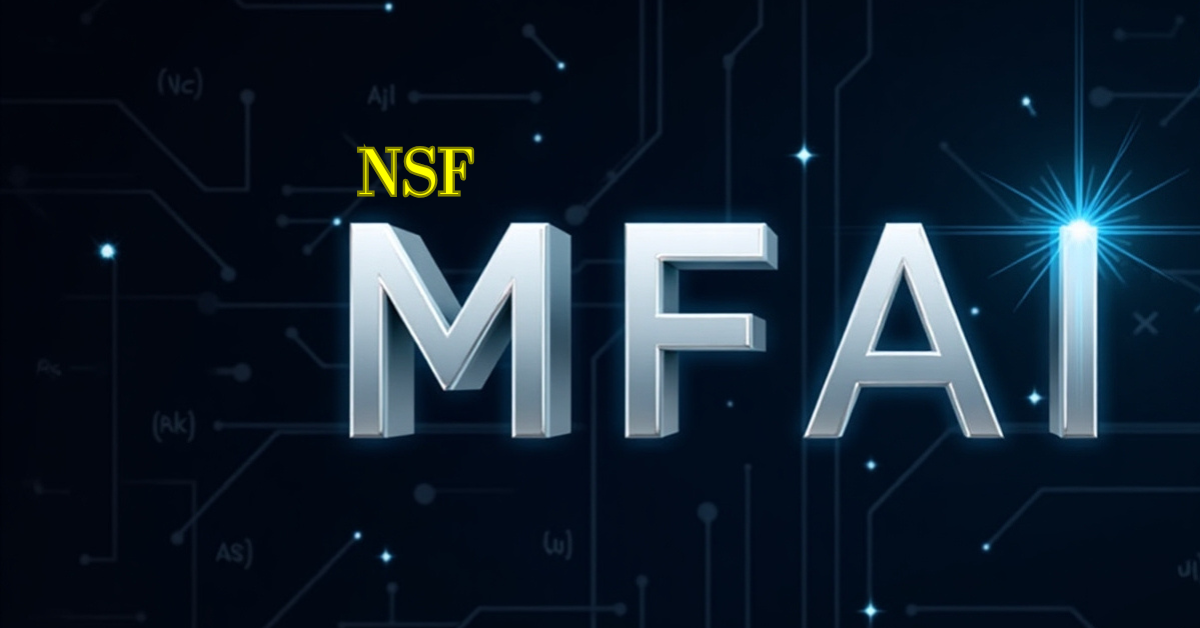The National Science Foundation (NSF) announced the Mathematical Foundations of Artificial Intelligence (MFAI) program, which targets strengthening AI through rigorous mathematical and theoretical research. In a rapidly changing world where artificial intelligence is becoming an integral part of industries and even the whole of society, the necessity for a comprehensive understanding of AI principles, limitations, and capabilities at not only an ordinary but deep level of mathematics has become even higher.
The main aim of this program is to remove any gaps in artificial intelligence awareness that are necessary by encouraging interdisciplinary collaborations between mathematicians, statisticians, computer scientists, engineers, and social scientists. The NSF MFAI program will back up research that enhances the theoretical basics of AI so that AI models will be safe, understandable, and morally right.
Program Objectives
The NSF MFAI program is designed to achieve several key objectives:
Investigate Fundamental AI Questions
- Address foundational challenges in AI and machine learning to enhance our theoretical understanding.
- Examine the mathematical structures that underlie modern AI models.
Develop Mathematically Sound AI Principles
- Establish rigorous design and analysis frameworks for next-generation AI systems.
- Introduce new mathematical methods to enhance AI’s reliability, efficiency, and interpretability.
Ensure Explainability and Trustworthiness
- Promote the development of transparent AI models.
- Create methodologies for validating machine learning algorithms and predictions to ensure robustness.
Enhance Interdisciplinary Collaboration
- Encourage research partnerships between diverse institutions and academic disciplines.
- Support cross-domain innovation that applies mathematical theories to AI advancements.
Research Focus Areas
The MFAI program supports research in multiple key areas of mathematical AI development:
Understanding AI Capabilities and Limitations
One of the core goals of MFAI is to explore AI’s theoretical boundaries. This includes:
- Analyzing AI models’ computational complexity and generalization capabilities.
- Understanding the behavior and convergence properties of deep learning models.
- Investigating the trade-offs between bias, variance, and efficiency in learning algorithms.
Design and Analysis of AI Models
- Formulating new optimization techniques that improve neural network training.
- Developing probabilistic models that enhance AI’s predictive performance.
- Creating mathematically robust architectures to prevent adversarial attacks and biases.
Validation of Machine Learning Algorithms
- Establishing rigorous validation frameworks to ensure AI reliability in real-world applications.
- Enhancing verification techniques to measure AI’s performance across diverse datasets.
- Developing methods to detect and mitigate biases in AI systems.
Ensuring Reliability and Generalization
- Designing AI systems that are generalizable across multiple domains.
- Addressing challenges in federated learning, where AI models learn from decentralized data sources.
- Exploring theoretical guarantees to improve AI’s adaptability and scalability.
Mathematical Theories for Human-Centric AI
- Integrating AI with cognitive science, social sciences, and ethics.
- Ensuring AI models align with human values and societal norms.
- Creating mathematically grounded methods for explainability and fairness.
Funding, Grants, and Collaboration Opportunities
The MFAI program is the recipient of a $4.5 million grant from the National Science Foundation that supports multi-year projects aimed at solving fundamental AI challenges. The money is expected to support 10-15 different projects, and among the three and the four, the one chosen to be the best is the one to be made. The program is followed by researchers from diverse fields, including mathematics, statistics, computer science, and engineering, who work together to provide original insights into AI’s foundations.
Key Details
- Funding Agency: National Science Foundation (NSF)
- Total Budget: $4.5 million
- Duration: Up to 3 years per project
- Eligibility: Open to academic institutions, research centers, and interdisciplinary teams
- Proposal Deadline: October 10, 2024
For scientists who want to create a theory of AI that is based on understanding the brain for better technology, Mphasis provides a very good opportunity to create the lastest standards of math in society. National Science Foundation supports cross-disciplinary research, stating that the different ideas and expertise diversity are the key points.
Impact on the Future of AI
The Mathematical Foundations of AI program is expected to influence AI research and development significantly in the coming years. By grounding AI advancements in rigorous mathematical frameworks, the program ensures:
- More reliable and interpretable AI models
- Theoretical advancements that enhance AI efficiency
- Stronger foundations for AI safety and fairness
- Innovative methodologies for emerging AI paradigms
With AI playing a crucial role in industries ranging from healthcare and finance to cybersecurity and autonomous systems, the MFAI initiative will provide researchers with the tools to address fundamental AI limitations and challenges.
Conclusion
The NSF’s Mathematical Foundations of Artificial Intelligence (MFAI) is making a great leap towards creating AI systems that are rigorously based on mathematics. The program is estimated to make it possible for AI technologies to be more reliable, understandable, and efficient through the promotion of interdisciplinary research and tackling the fundamental AI challenges. For instance, better mathematical models would be able to provide more accurate AI in such areas as driverless cars and medical diagnostics.
For more details on funding opportunities, eligibility criteria, and application procedures, visit the official NSF MFAI program page:

No responses yet